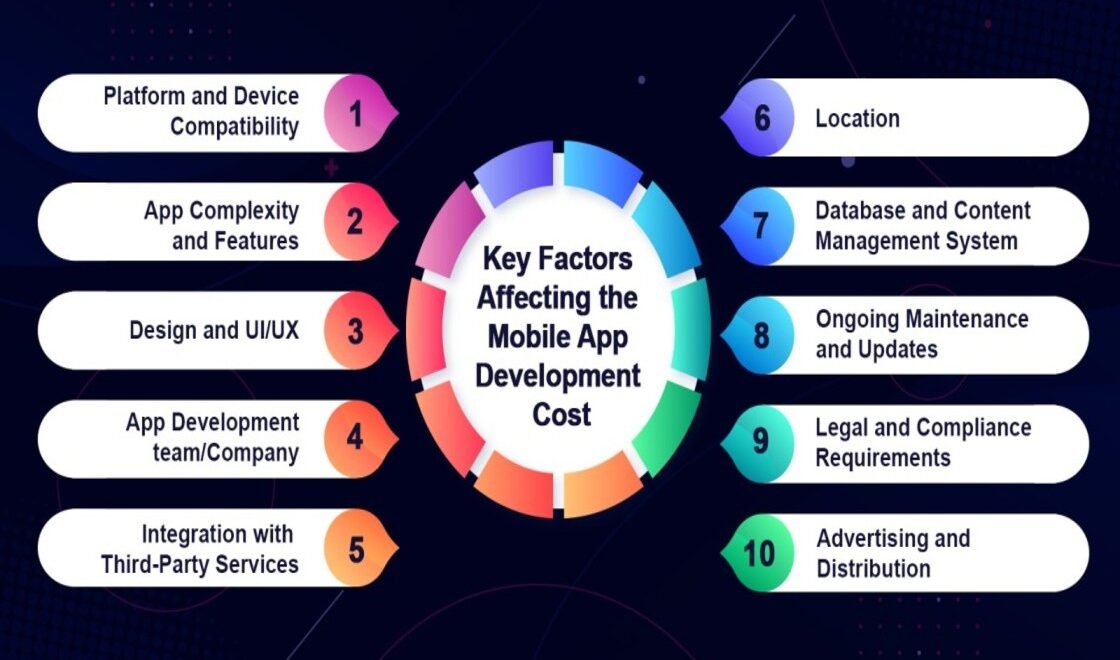Nowadays, mobile phones are transforming every business, prompting many entrepreneurs to develop mobile apps for their companies. Building a successful mobile app takes more than just a great idea. When exploring app development, they often wonder about the costs involved and why building apps can be so expensive. Developing an app requires careful planning and consideration of several factors that affect the overall cost.
Understanding these key factors is essential for businesses to use their resources wisely and create a high-quality app within budget. Numerous factors impact the overall cost of mobile app development. In this article, we will look at the top 10 most important factors are
Top 10 Key Factors Affecting the App Development Cost
Developing an app involves a variety of factors that influence the overall cost. Here are the key elements that affect app development costs:
1. Platform and Device Compatibility
One of the main factors influencing the cost of mobile app development is the type of app being created.
Developing for one platform (iOS or Android) is less expensive than developing for both. iOS and Android require distinct development efforts due to their differing requirements.
Initially, it’s advisable to build your app for a single platform to evaluate its performance and then decide whether it’s worthwhile to expand to the other platform.
Using cross-platform development frameworks (like React Native or Flutter) can be cost-effective rather than native apps. Ensuring the app works seamlessly across various devices (phones, tablets, wearables) adds to the cost.
2. App Complexity and Features
Adding different mobile app features will affects the app development costs. Basic apps with minimal functionality tend to be less expensive than customized apps with product images.
Moderate complexity apps require features such as user authentication, real-time chat, payment gateways, or integration with APIs costs go high. Advanced apps with complex functionalities like AR/VR capabilities, AI integration, advanced data processing, or gaming features are the most expensive.
Complex apps require more financial investment. Therefore, it’s important to decide which type of app you want before starting development.
3. Design and UI/UX
Basic design reduces design costs. Whereas custom UI/UX designs tailored to enhance user engagement are more expensive. Also, advanced graphics, animations, and transitions increase development costs. If you opt for a template-based design, your cost estimate might be low at first. But if you want to change it a lot, it’ll end up costing you more money and taking longer to finish.
4. App Development Team/Company
Select an app development company that can work within your budget, and always set your budget before making a choice. Outsourcing is often the best option to minimize development costs compared to using an in-house team.
5. Integration with Third-Party Services
Third-party APIs integration(e.g., payment gateways, social media, geolocation services) needs more time to integrate which increases the overall cost. If you go with premium API service providers increase the costs.
6. Location
It might surprise you, but the geographical location of your development team can have a considerable impact on costs. The cost varies significantly by region. Developers in European countries generally command higher rates compared to those in Asia.
7. Database and Content Management System
Databases and Content Management Systems (CMS) are crucial for app development, handling data storage, management, and retrieval. The choice between a relational (SQL) or non-relational (NoSQL) database depends on the app’s requirements. SQL is well-suited for structured data and complex queries, while NoSQL offers flexibility for unstructured data. Costs include licensing fees, cloud storage, and database administration.
A CMS simplifies content handling, enabling easy updates without extensive coding. The custom CMS solutions impact initial costs and ongoing expenses for customization and security. Both of these factors can significantly increase your app development costs.
8. Advertising and Distribution
Advertising, Marketing, and distribution also impact the cost of app development. Effective advertising strategies help the app reach its target audience, driving downloads and user engagement. These strategies can include social media campaigns, influencer partnerships, and search engine marketing, all of which require a substantial budget.
Distribution costs include the expenses related to getting the app on various platforms and ensuring its smooth operation post-launch. This includes fees for listing on app stores like Apple’s App Store and Google Play, which charge a percentage of revenue or a yearly subscription fee.
9. Ongoing Maintenance and Updates
Do you think app development costs end with the deployment of the app in the app store? Remember, there’s a need for post-deployment maintenance and periodic updates. Continuous improvement, adding new features, and implementing major updates are necessary for any app. Therefore, it’s crucial to include maintenance costs in your dedicated budget.
10. Legal and Compliance Requirements
If your app collects users’ data, you must invest in legal and compliance measures to protect it from hackers, which can significantly impact development costs. Ensuring your app complies with regulations like GDPR for data protection or HIPAA for healthcare requires careful attention to legal standards and often means extra development work. This includes implementing stringent data security measures, obtaining necessary certifications, and regularly updating the app to stay compliant with evolving laws. Failure to meet these requirements can lead to costly fines and legal issues, making it essential to allocate a portion of your budget to legal and compliance considerations from the outset.
Choosing React Native application development services in India can significantly reduce development costs, while maintaining high performance. Since React Native enables cross-platform compatibility (iOS & Android) with a single codebase, you save significant time, effort, and resources—without compromising on quality.
Are you looking for mobile app development to build apps for your business? Reach out to us for more information at info@authorselvi.com
